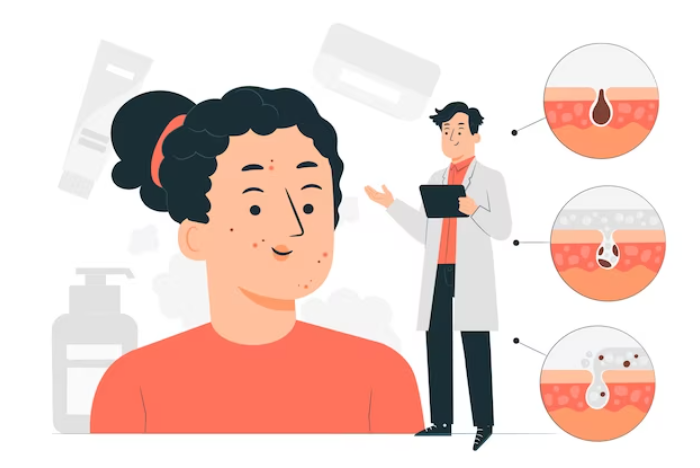Acne is a common skin condition that affects people of all ages. While it can be frustrating and sometimes even painful, the good news is that you can effectively manage and treat acne without visiting a doctor. In this article, we’ll explore five tips for treating acne using natural and over-the-counter solutions. Whether you’re looking for the best way to fight acne, tips for acne-prone skin, or remedies for acne scars, you’ll find helpful guidance here. Let’s get started on your journey to clearer, healthier skin.
1. Establish a Consistent Skincare Routine
A well-structured skincare routine is the foundation of managing acne. Here’s how to build a routine that works for you:
a. Gentle Cleansing: Use a mild, non-comedogenic (won’t clog pores) acne face wash to clean your skin. Cleansing helps remove excess oil and debris from the skin’s surface.
b. Acne Facial Moisturizer: Contrary to popular belief, moisturizing is essential, even for acne-prone skin. Look for an oil-free, non-comedogenic moisturizer to keep your skin hydrated without causing breakouts.
c. Spot Treatment: Over-the-counter (OTC) acne treatments with ingredients like benzoyl peroxide or salicylic acid can be used as spot treatments for pimples. Apply these directly to the affected areas.
d. Sun Protection: Protect your skin from the sun with a non-comedogenic sunscreen. Some acne treatments can make your skin more sensitive to UV rays.
e. Consistency: Stick to your routine daily, even when you don’t have active breakouts. Consistency is key to preventing future acne.
2. Use Over-the-Counter Acne Products
You can find a variety of OTC acne products that are effective in managing acne. Some options include:
a. Benzoyl Peroxide: This ingredient is known for its ability to kill the bacteria that causes acne. It can be found in cleansers, creams, and gels.
b. Salicylic Acid: Salicylic acid is effective at exfoliating the skin and unclogging pores. It’s often found in acne face washes and spot treatments.
c. Sulfur: Sulfur is another ingredient that can help reduce acne by drying out excess oil and promoting peeling of the top layer of skin.
d. Alpha Hydroxy Acids (AHAs): AHAs can help improve skin texture and reduce the appearance of acne scars. They’re often used in chemical exfoliants.
Before using any OTC product, read the label and follow the instructions. Start with a lower concentration to minimize the risk of irritation and increase as needed.
3. Home Remedies for Acne Scars
If you’re looking for natural treatments to reduce acne scars, consider these home remedies:
a. Aloe Vera: Aloe vera has anti-inflammatory and skin-healing properties. Apply fresh aloe vera gel to the scars and leave it on for about 30 minutes before rinsing.
b. Honey: Honey is a natural humectant and can help moisturize the skin. You can apply raw honey as a mask to promote healing and reduce scarring.
c. Lemon Juice: Lemon juice contains alpha hydroxy acids that can exfoliate the skin and improve the appearance of scars. Mix lemon juice with water and apply it to the scars for 10-15 minutes before rinsing.
d. Tea Tree Oil: Tea tree oil has antibacterial properties. Dilute a few drops of tea tree oil with a carrier oil and apply it to the scars.
e. Rosehip Seed Oil: Rosehip seed oil is rich in essential fatty acids and vitamins that can improve skin texture and reduce scars. Apply it to the scars and massage gently.
Remember that natural remedies may take time to show results, and it’s important to be patient and consistent in their use.
4. Dietary Considerations
What you eat can impact your skin health. While diet alone is not a direct cause of acne, certain foods may exacerbate the condition for some individuals. Consider the following dietary tips:
a. Limit High Glycemic Foods: Foods with a high glycemic index, such as sugary and starchy items, can lead to spikes in blood sugar levels, which may worsen acne for some people.
b. Dairy Reduction: Some studies suggest a link between dairy consumption and acne. Consider reducing dairy intake to see if it affects your skin.
c. Stay Hydrated: Drinking enough water helps keep your skin hydrated and can improve its overall health.
d. Omega-3 Fatty Acids: Foods rich in omega-3 fatty acids, such as fatty fish and flaxseeds, can have anti-inflammatory effects that may benefit acne-prone skin.
e. Antioxidant-Rich Foods: Antioxidants, found in fruits and vegetables, can help protect your skin from damage and promote healing.
5. Avoid Skin Aggravators
Certain habits and external factors can exacerbate acne. To prevent further breakouts, consider the following:
a. Don’t Pick or Squeeze: Picking at acne can worsen inflammation and increase the risk of scarring. Leave blemishes alone and let them heal naturally.
b. Clean Your Phone: Your phone can collect dirt and bacteria, so it’s important to clean it regularly or use hands-free devices to avoid contact with your face.
c. Avoid Excessive Makeup: Heavy or oil-based makeup can clog pores. Choose non-comedogenic makeup and remember to remove it before bed.
d. Keep Hair Clean: Oily hair can transfer oil and dirt to your face. Regular hair washing can help prevent breakouts.
e. Stress Management: High stress levels can trigger or exacerbate acne. Practice stress-reduction techniques, such as exercise, meditation, or deep breathing.
Conclusion: Achieving Clearer Skin Naturally
Treating acne without visiting a doctor is possible and often highly effective. A well-structured skincare routine, the use of OTC products, natural remedies for acne scars, dietary considerations, and avoiding skin aggravators can significantly improve the condition of your skin. It’s important to remember that results may vary from person to person, and it may take time to see improvements. If you have severe or persistent acne, or if you’re unsure about which treatments are best for you, consult with a dermatologist for personalized guidance.



